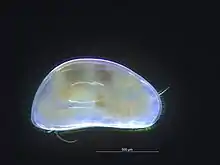Candonidae
Candonidae is a family of ostracods, containing around 25% of all known species of freshwater ostracods.[1] Around 75% of genera in the family are endemic to a single zoogeographic region.[1] It contains more than 500 species, of which more than 300 are endemic to the Palearctic realm.[1]
| Candonidae | |
|---|---|
 | |
| Candona candida | |
| Scientific classification | |
| Domain: | Eukaryota |
| Kingdom: | Animalia |
| Phylum: | Arthropoda |
| Class: | Ostracoda |
| Order: | Podocopida |
| Superfamily: | Cypridoidea |
| Family: | Candonidae Kaufmann, 1900 |
| Subfamilies | |
| |
Cyclocypridinae are generally good swimmers,[2] but Candoninae is unable to swim.[3]
Paracypridinae lives in marine and brackish waters,[4] although a few can live in freshwater.[5][6]
Taxonomy
The following genera are recognised in the family Candonidae:[7]
- Aglaiella Daday, 1910 †
- Aglaiocypris Sylvester-Bradley, 1947
- Acandona
- Allocypria Rome, 1962
- Amphitritecandona Karanovic, 2007
- Areacandona Karanovic, 2005
- Baicalocandona Mazepova, 1976
- Candobrasilopsis Higuti & Martens, 2012
- Candona Baird, 1845
- Candonopsis Vavra, 1891
- Coralliaglaia Hartmann, 1974
- Cyclocypris Brady & Norman, 1889
- Cryptocandona Kaufmann, 1900
- Damonella Anderson, 1966 †
- Deminutiocandona Karanovic, 2003
- Dolerocypria Tressler, 1937
- Electrocypria Wang, Matzke-Karasz & Horne, 2022
- Eucandona Daday, 1900
- Fabaeformiscandona Krstic, 1972
- Gerdocypris McKenzie, 1983 †
- Ghardaglaia Hartmann, 1964
- Hancockcandonopsis Karanovic, 2018
- Hansacypris Wouters, 1984
- Humphreyscandona Karanovic & Marmonier, 2003
- Indocandona Gupta, 1984
- Kempfcyclocypris Karanovic, 2011
- Kencandona Karanovic, 2007
- Keysercypria Karanovic, 2011
- Latinopsis Karanovic & Datry, 2009
- Leicacandona Karanovic, 2007
- Mangalocypria Wouters, 1998
- Mazepovacandona Karanovic & Sitnikova, 2017
- Meischcandona Karanovic, 2001
- Meridiescandona Karanovic, 2003
- Mungava Harding, 1962
- Myanmarcypris Wang, Matzke-Karasz, Horne, Zhao, Cao, Zhang & Wang, 2020 †
- Neglecandona
- Neocandona Karanovic, 2005
- Notacandona Karanovic & Marmonier, 2003
- Origocandona Karanovic, 2005
- Paracandona Hartwig, 1899 †
- Paracypria Sars, 1910
- Paracypris Sars, 1866
- Parapontoparta Hartmann, 1955
- Phlyctenophora Brady, 1880
- Physocypria Vávra, 1897
- Pierrecandona Karanovic, 2007
- Pilbaracandona Karanovic & Marmonier, 2003
- Pioneercandonopsis Karanovic, 2005
- Pontoparta Vavra, 1901
- Pseudocandona Kaufmann, 1900
- Reconcavona Krömmelbein, 1962 †
- Renaudcypris McKenzie, 1980
- Salvadoriella Krömmelbein, 1963 †
- Tasmanocypris McKenzie, 1979
- Thalassocypria Hartmann, 1957
- Trajancandona Karanovic, 1999
- Trapezicandona Schornikov, 1969
- Triangulocypris Teeter, 1975
- Typhlocypris Vejdovsky, 1882
See also
- Fabaeformiscandona aemonae, an endangered species from Slovenia
- Namibcypris, an extinct genus from Namibia
- Typhlocypris
- Cyprididae, a family containing 50% of all freshwater ostracods
References
- Koen Martens; Isa Schön; Claude Meisch; David J. Horne (2008). "Global diversity of ostracods (Ostracoda, Crustacea) in freshwater". In Estelle V. Balian; Christian Lévêque; Hendrik Segers; Koen Martens (eds.). Freshwater Animal Diversity Assessment. Developments in Hydrobiology. Springer. doi:10.1007/s10750-007-9245-4. ISBN 978-1-4020-8258-0.
- Some aspects of the paleoecology and distribution of non-marine ostracoda from Upper Cretaceous intertrappean deposits and the Lameta Formation of peninsular India – page 67
- Thorp and Covich's Freshwater Invertebrates: Volume 4: Keys to Palaearctic Fauna
- Candoninae (Ostracoda) from the Pilbara Region in Western Australia
- Genus Paracypria Sars, 1910 - Lake Biwa Museum
- Losing the Bounty? Investigating Species Richness in Isolated Freshwater Ecosystems of Oceania
- "WoRMS - World Register of Marine Species - Candonidae Kaufmann, 1900". www.marinespecies.org. Retrieved 2022-12-12.
This article is issued from Wikipedia. The text is licensed under Creative Commons - Attribution - Sharealike. Additional terms may apply for the media files.